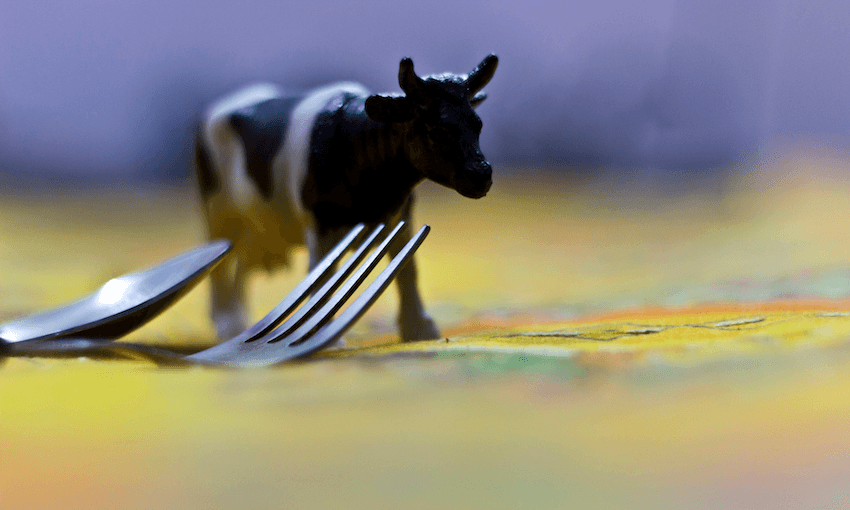The Spinoff partnered with UMR to survey the attitudes of our readers, and the nation as a whole. Today, how much meat is the country eating? And is that changing?
You’ve probably got stereotypes in your head about vegetarians. You’ve definitely got stereotypes in your head about vegans.
But would it surprise you to know, reader of The Spinoff, that other readers of The Spinoff are much less likely to be meat-eaters? Not in the slightest? Cool, cool.
What we see from this graph is a combination of data points that cumulatively add up to a lot less red meat being eaten by Spinoff readers compared to the rest of the country. The difference is only a few percentage points on each count, though it is a statistically significant jump for vegetarians. But we live in a country with elected representatives who lost the plot over Air NZ putting a fake meat burger on a plane, so even that puts us somewhat out of step with the rest of the nation.
What could be driving these attitudes? It could be that food culture itself is changing, to be more inclusive of vegetarian diets. It’s not really on for restaurants to not have a worthwhile vegetarian option on the menu any more, for example. Alice Neville, pescatarian food editor of The Spinoff, put it like this.
“In the past few years, meat-free eating – or at least meat-minimal eating – has definitely become more mainstream. While the fact I can be a food editor and not eat meat still horrifies some, I get far fewer shocked comments than when I started working working for a food magazine five years ago. The fact that chefs have by and large moved on from the macho 90s bullshit of hating vegos and realised that there is a world beyond meat is really heartening, and means that every day it’s getting easier – and more exciting – to dine out in New Zealand as a non-meat-eater.”
And that correlates with how people say their behaviours are changing. Our survey found that among the population at large, people are far more likely to be eating less meat than more meat, compared to last year. And among Spinoff readers, the difference was huge – more than half of the respondents said they were eating less meat.
Our survey was not by any means alone in this finding. OECD data shows that over the 10 years between 2007-17, New Zealanders ate more pork and chicken, but a lot less sheep and beef. Red meat would once have been considered the staples of the Kiwi diet, but that’s not necessarily the case any more.
But there’s one defining point in the attitudes of Spinoff readers which goes a long way towards explaining the rise in non-meat-eating, shown by these charts here.
The environmental impact of farming is far more widely known now than it was a decade ago, and far more widely talked about too. The data on exactly how much this impact has is contested, but one thing is clear – red meat farming just isn’t great for the environment.
That manifests itself in all sorts of ways. It’s the freshwater quality of rivers in areas with high numbers of dairy farms. It’s the sheer amount of water that needs to be used to grow pasture for cows and sheep, compared to other types of farming. It’s the fact that cows burp rather frequently, and the methane that comes out of their stomachs is one of the biggest contributors to New Zealand’s total emissions profile.
Not only are Spinoff readers clearly concerned by that on the basis of these numbers, to a degree those concerns have become relatively mainstream. Even farming organisations themselves have taken notice of that – for example, with Fonterra and farm supplies manufacturer Ravensdown signing on to be part of the Climate Leaders Coalition.
But it’s far from a universal opinion, says Alice Neville. “You only need to look at the outcry in response to Green co-leader James Shaw’s gentle suggestion that people who want to help the environment could consider eating less meat to realise that.” And it should also be remembered that almost 200,000 New Zealanders are employed in the agriculture industry in some shape or form, and for many more rural parts of the country, it remains the bedrock of the economy.
So is the country, or even the readership of The Spinoff, ready for a vegetarian revolution? On these figures you’d have to say no, but it is clearly changing. And as for the stereotypes about vegans and vegetarians, it’s probably time they were dumped too.
Disclosure: The Spinoff’s Food section is sponsored by Freedom Farms.
The Bulletin is The Spinoff’s acclaimed, free daily curated digest of all the most important stories from around New Zealand delivered directly to your inbox each morning.
